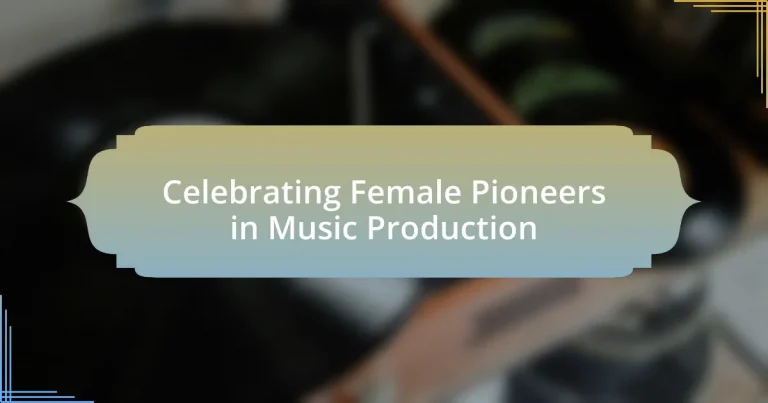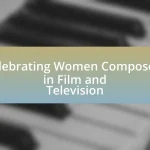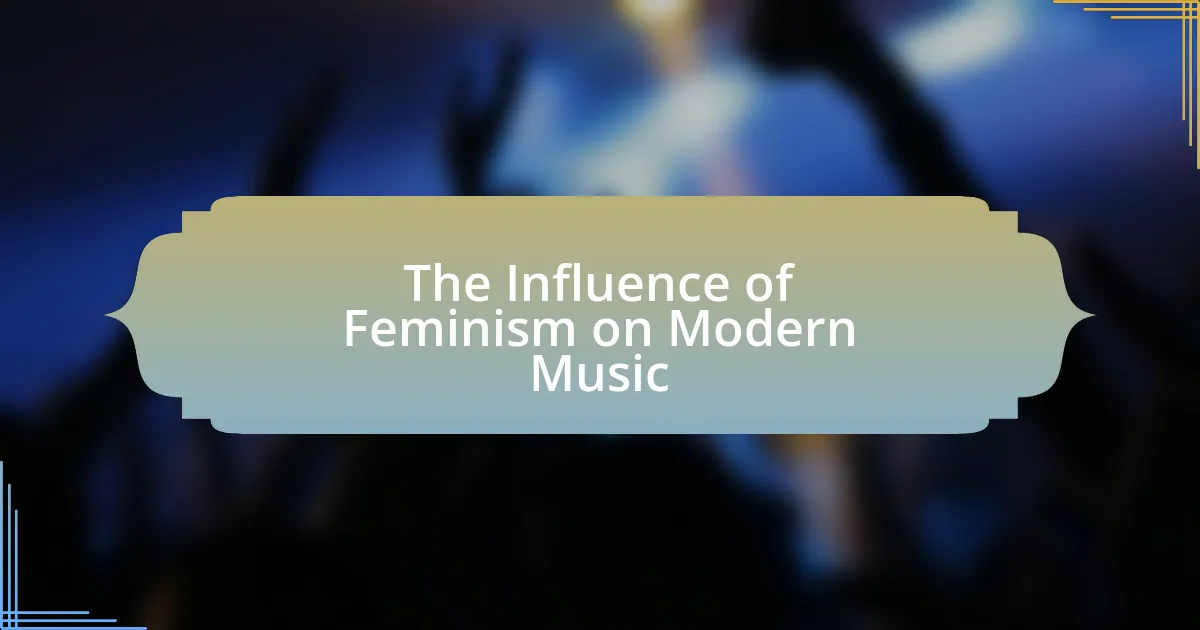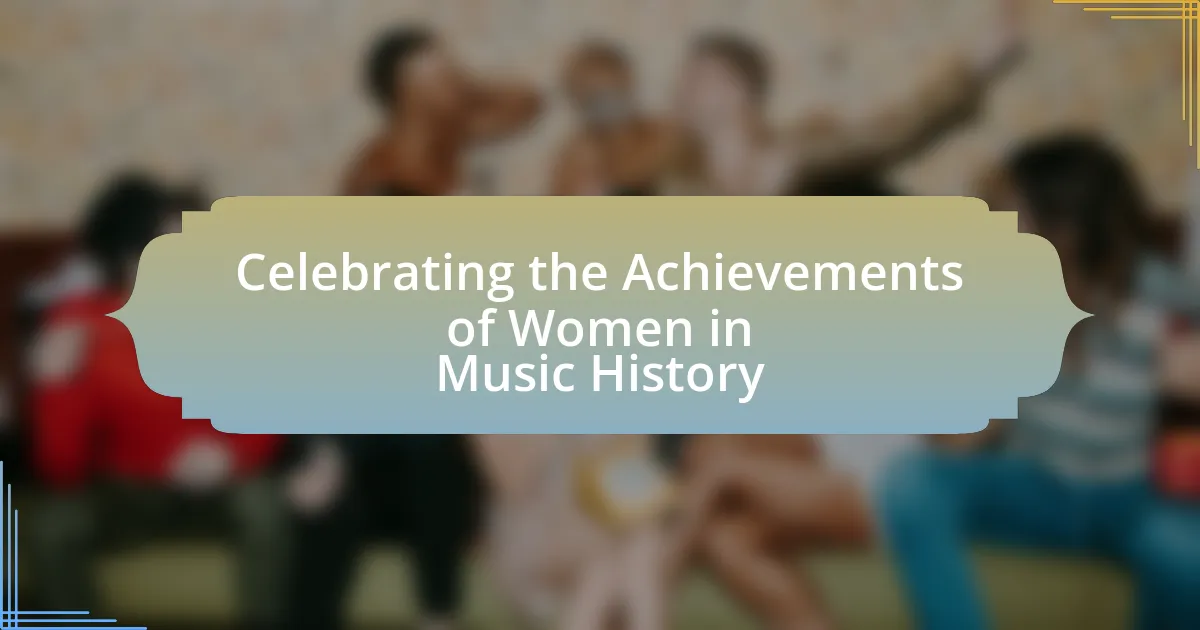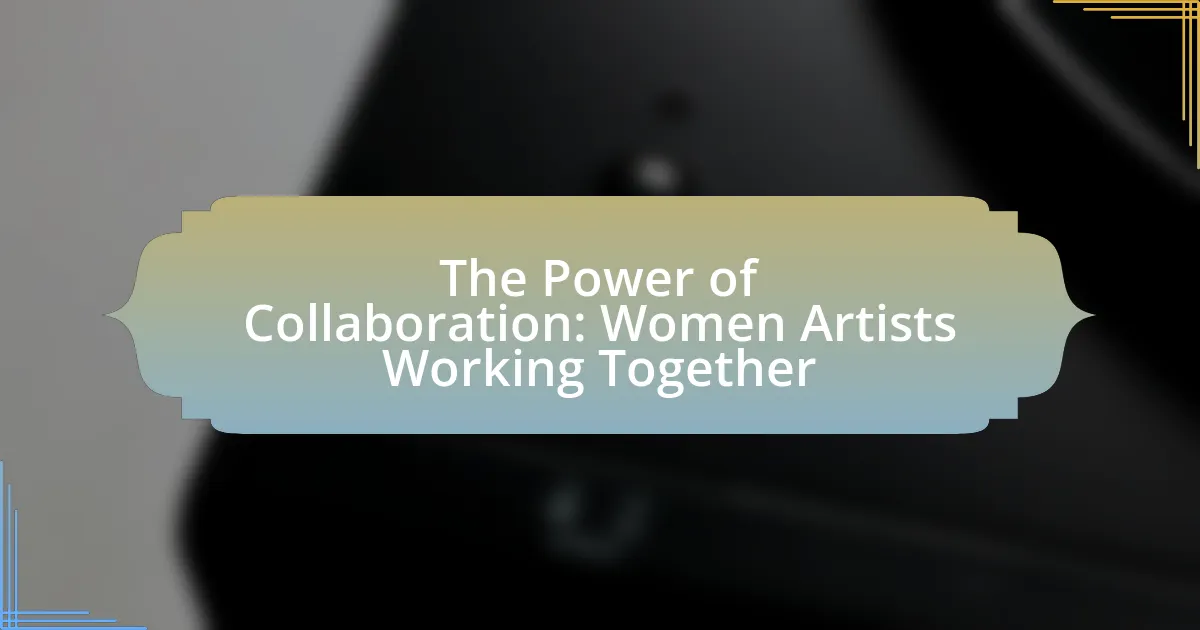The article focuses on celebrating female pioneers in music production, highlighting their significant contributions and the systemic barriers they have overcome in a historically male-dominated industry. It discusses the importance of recognizing women’s roles in music production, the historical context of their involvement, and the evolution of societal perceptions regarding female producers. Notable figures such as Sylvia Massy, Wendy Carlos, and Sylvia Robinson are examined for their groundbreaking work, while the article also addresses the challenges faced by women in the field and the initiatives aimed at promoting gender equality. Furthermore, it explores how technology and emerging trends are shaping the future for female producers, emphasizing the need for mentorship and networking to enhance their careers.
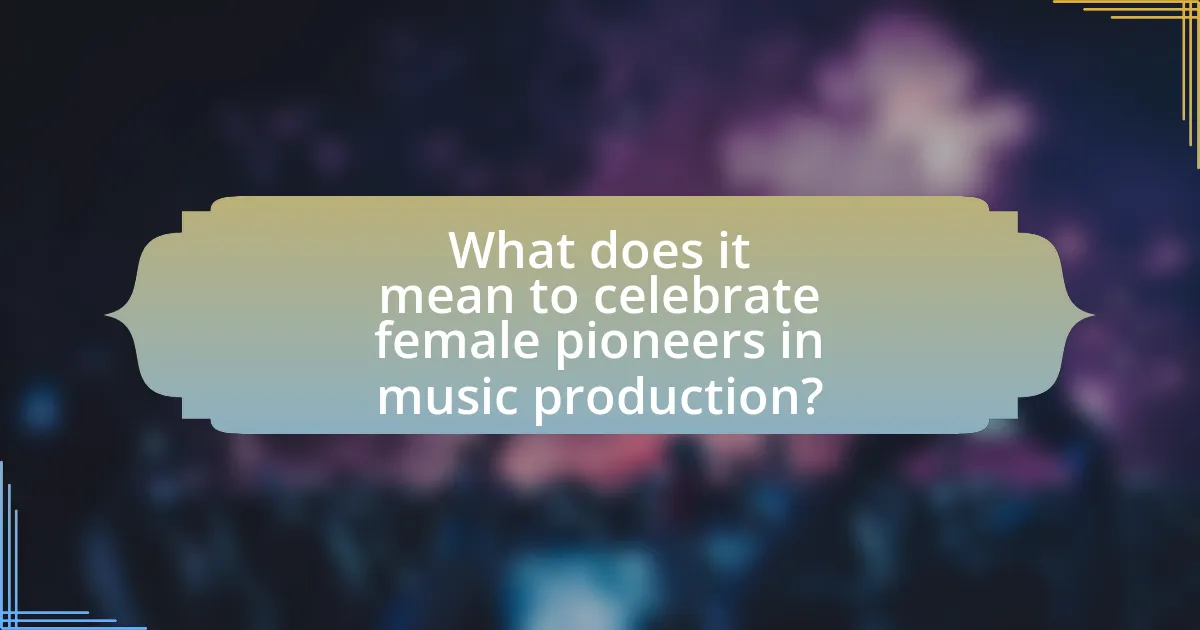
What does it mean to celebrate female pioneers in music production?
Celebrating female pioneers in music production means recognizing and honoring the contributions of women who have significantly influenced the field, often overcoming systemic barriers. This celebration highlights the achievements of individuals like Sylvia Massy and Wendy Carlos, who have played crucial roles in shaping sound engineering and electronic music. Acknowledging their work not only promotes gender equality in a historically male-dominated industry but also inspires future generations of female producers. The impact of these pioneers is evidenced by their innovative techniques and the diverse soundscapes they created, which continue to resonate in contemporary music.
Why is it important to recognize female contributions in music production?
Recognizing female contributions in music production is crucial for achieving gender equality and fostering diversity in the industry. Historically, women have played significant roles in music production, yet their contributions have often been overlooked, leading to a lack of representation. For instance, in the 1970s, Sylvia Robinson co-founded Sugar Hill Records and produced “Rapper’s Delight,” a pivotal track in hip-hop history. Acknowledging such contributions not only honors these pioneers but also inspires future generations of female producers, encouraging a more inclusive environment that can lead to innovative and diverse musical expressions.
What historical context surrounds women’s roles in music production?
Women’s roles in music production have historically been marginalized, often relegated to supportive positions rather than leadership roles. In the early 20th century, women like Clara Rockmore and Mary Lou Williams began to break barriers in music technology and jazz, respectively, but systemic gender biases limited their recognition. The 1970s saw a shift with artists like Sylvia Robinson and Joan Jett, who not only produced music but also challenged industry norms, paving the way for future female producers. By the 1990s and 2000s, figures such as Missy Elliott and Linda Perry emerged, demonstrating that women could excel in production roles, leading to increased visibility and acceptance in the industry. This evolution reflects broader societal changes regarding gender equality and has contributed to a more inclusive music production landscape today.
How have societal perceptions of women in music production evolved?
Societal perceptions of women in music production have evolved from viewing them primarily as performers to recognizing them as skilled producers and engineers. Historically, women faced significant barriers in the male-dominated music industry, often relegated to roles such as vocalists or songwriters. However, the rise of influential female producers, such as Sylvia Massey and Linda Perry, has challenged these stereotypes and highlighted women’s technical expertise. Recent studies indicate that the percentage of women in production roles has increased, with organizations like Women in Music advocating for gender equality and representation. This shift reflects a broader cultural change, acknowledging women’s contributions and capabilities in all facets of music production.
Who are some notable female pioneers in music production?
Notable female pioneers in music production include Sylvia Massy, who is known for her work with artists like Tool and System of a Down, and Linda Perry, recognized for producing hits for Pink and Christina Aguilera. Additionally, Janet Jackson made significant contributions to music production with her innovative sound and collaborations. These women have not only shaped the music industry but have also paved the way for future generations of female producers, demonstrating their influence through successful careers and groundbreaking projects.
What contributions did these pioneers make to the industry?
Female pioneers in music production significantly advanced the industry by breaking gender barriers and introducing innovative techniques. For instance, Sylvia Massy is renowned for her work on albums like Tool’s “Undertow,” where she utilized unconventional recording methods that enhanced sound quality and creativity. Similarly, Linda Perry, known for producing hits for artists like Pink and Christina Aguilera, brought a unique songwriting perspective that reshaped pop music. These contributions not only elevated the artistic quality of music but also paved the way for future generations of female producers, demonstrating that women can excel in a predominantly male-dominated field.
How did their work influence future generations of female producers?
The work of female pioneers in music production significantly influenced future generations of female producers by breaking gender barriers and establishing a precedent for women’s roles in the industry. These trailblazers, such as Sylvia Robinson and Linda Perry, demonstrated that women could excel in technical and creative aspects of music production, paving the way for others to follow. Their success stories inspired a new wave of female producers, leading to increased visibility and opportunities for women in a historically male-dominated field. For instance, the rise of female producers in the 1990s and 2000s, like Missy Elliott and Timbaland’s collaborations, showcased the impact of earlier pioneers, reinforcing the notion that women could not only participate but also lead in music production.
What challenges have female music producers faced throughout history?
Female music producers have faced significant challenges throughout history, primarily due to systemic gender biases and a lack of representation in the industry. Historically, the music production field has been male-dominated, which has led to limited opportunities for women to enter and succeed in this profession. For instance, in the 1970s and 1980s, only about 5% of producers in the music industry were women, highlighting the stark gender disparity. Additionally, female producers often encountered skepticism regarding their technical abilities and faced barriers in gaining access to recording studios and equipment, which were typically controlled by male counterparts. This lack of access not only hindered their professional growth but also contributed to the perpetuation of stereotypes that women were less capable in technical roles. Furthermore, female music producers have frequently had to navigate a culture of sexism and harassment, which has further complicated their careers and contributions to the industry.
What barriers exist in the music industry for women producers?
Barriers in the music industry for women producers include gender bias, lack of representation, and limited access to resources. Gender bias manifests in the form of stereotypes that question women’s technical abilities and leadership skills, often leading to fewer opportunities for women in production roles. The lack of representation is evident, as women make up only about 2% of producers in the industry, which perpetuates a cycle of exclusion and diminishes visibility for aspiring female producers. Additionally, limited access to resources such as funding, mentorship, and industry networks further hinders women’s ability to succeed in music production, as highlighted by studies showing that women often face challenges in securing financing for their projects compared to their male counterparts.
How have these challenges been addressed over time?
Challenges faced by female pioneers in music production have been addressed through increased representation, advocacy for gender equality, and the establishment of supportive networks. Over time, initiatives such as the creation of organizations like Women in Music and the introduction of mentorship programs have provided resources and opportunities for women in the industry. Additionally, the rise of social media has allowed female producers to showcase their work, gain visibility, and connect with peers, thereby fostering a more inclusive environment. Statistics indicate that the percentage of women in music production roles has gradually increased, reflecting these efforts to combat historical gender disparities.
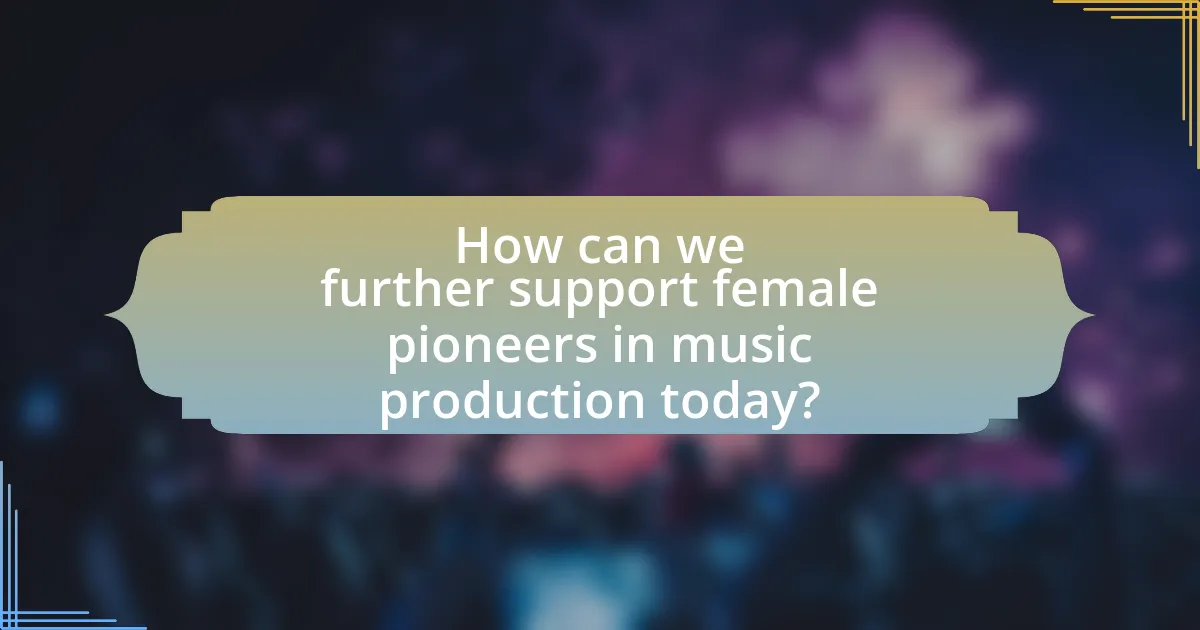
How can we further support female pioneers in music production today?
To further support female pioneers in music production today, we can increase funding for initiatives that promote their work and provide mentorship opportunities. Research shows that women in music production face significant barriers, including lack of access to resources and networks; for instance, a 2021 report by the Annenberg Inclusion Initiative found that only 2% of producers across popular music are women. By establishing grants specifically for female producers and creating programs that connect them with experienced mentors, we can help bridge the gap and foster a more inclusive environment in the industry.
What initiatives exist to promote women in music production?
Initiatives that promote women in music production include organizations like Women in Music, which provides networking opportunities, educational resources, and mentorship programs specifically for women in the industry. Additionally, the She Is The Music initiative focuses on increasing the number of women in music production through advocacy, research, and community-building efforts. Furthermore, the SoundGirls organization offers workshops and training sessions aimed at empowering women in audio engineering and production roles. These initiatives collectively aim to address the gender imbalance in music production and create a more inclusive environment for women.
How do mentorship programs impact aspiring female producers?
Mentorship programs significantly enhance the career trajectories of aspiring female producers by providing essential guidance, networking opportunities, and industry insights. These programs connect emerging female talent with experienced professionals who can offer personalized advice, share industry knowledge, and help navigate challenges specific to women in the music production field. Research indicates that women who participate in mentorship programs report increased confidence and improved skills, which directly correlates with higher success rates in securing jobs and advancing their careers. For instance, a study by the Women’s Audio Mission found that 90% of participants felt more empowered and capable in their roles after engaging in mentorship, highlighting the transformative impact of these initiatives on aspiring female producers.
What role do organizations play in supporting female talent in the industry?
Organizations play a crucial role in supporting female talent in the music production industry by implementing initiatives that promote gender equality and provide resources for professional development. These initiatives often include mentorship programs, networking opportunities, and workshops specifically designed to empower women in music production. For instance, organizations like Women in Music and She Is the Music actively work to increase visibility for female producers and create platforms for their work, which is essential in an industry historically dominated by men. Research indicates that companies with diverse leadership teams are 21% more likely to outperform their peers, highlighting the importance of supporting female talent for overall industry success.
How can the industry create a more inclusive environment for women in music production?
The industry can create a more inclusive environment for women in music production by implementing targeted mentorship programs and promoting gender diversity initiatives. Research indicates that mentorship significantly enhances career advancement opportunities for women, as evidenced by a study from the Women’s Audio Mission, which found that women who participated in mentorship programs reported increased confidence and skill development. Additionally, organizations like the Recording Academy have launched initiatives aimed at increasing female representation in production roles, highlighting the importance of visibility and support for women in the field. By fostering a culture that prioritizes mentorship and diversity, the industry can effectively support and empower women in music production.
What policies can be implemented to support gender equality in music production?
Implementing policies such as mandatory diversity quotas in music production teams can significantly support gender equality. These quotas ensure that a certain percentage of women are included in production roles, which has been shown to increase representation and influence in the industry. For instance, the 2019 report by the Annenberg Inclusion Initiative found that women comprised only 2% of producers in popular music, highlighting the need for targeted policies. Additionally, providing funding for programs that support women in music production, such as mentorship and training initiatives, can further enhance their participation and success in the field.
How can male allies contribute to the advancement of women in the field?
Male allies can contribute to the advancement of women in the field of music production by actively promoting gender equality and providing support in professional settings. They can advocate for equal opportunities, ensuring that women receive the same access to resources, mentorship, and career advancement as their male counterparts. Research indicates that diverse teams lead to better creativity and innovation, which underscores the importance of including women in music production roles. Furthermore, male allies can challenge discriminatory practices and biases within the industry, fostering an inclusive environment that empowers female pioneers. By leveraging their influence, male allies can help dismantle systemic barriers, ultimately enhancing the representation and success of women in music production.
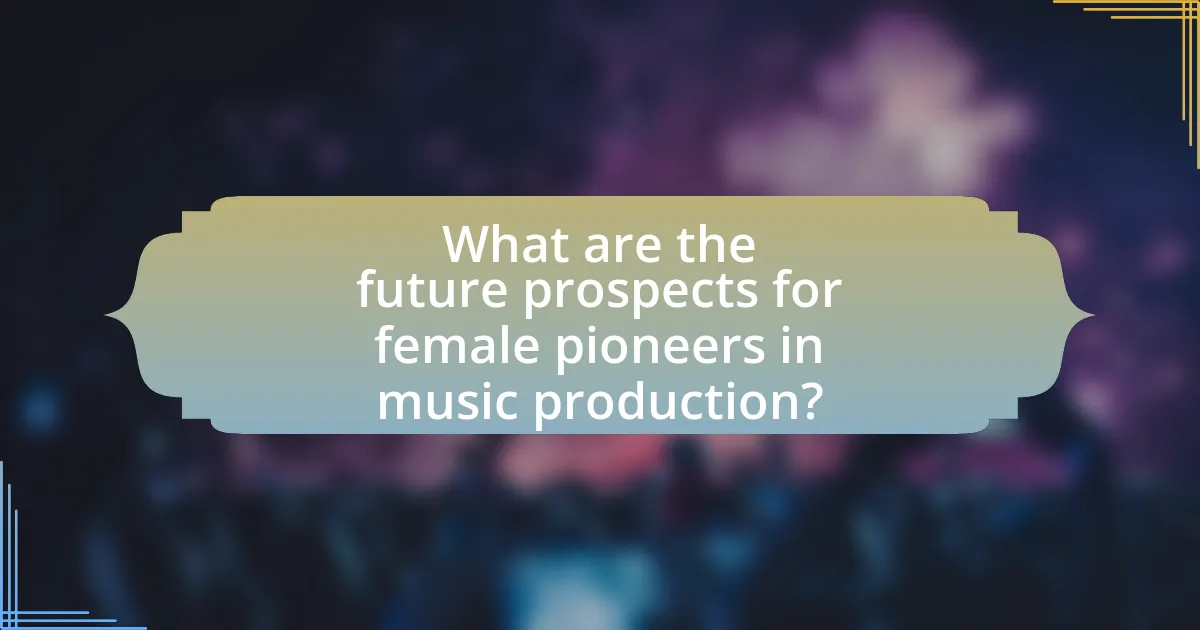
What are the future prospects for female pioneers in music production?
The future prospects for female pioneers in music production are increasingly promising due to a growing recognition of their contributions and the expansion of opportunities within the industry. The rise of digital technology and accessible production tools has democratized music creation, allowing more women to enter the field. According to a 2021 report by the Annenberg Inclusion Initiative, women made up 21.6% of all producers in popular music, a figure that is gradually increasing as initiatives aimed at promoting gender diversity gain traction. Furthermore, organizations like Women in Music and She Is the Music are actively working to support and mentor female producers, enhancing their visibility and career advancement. This shift indicates a positive trajectory for female pioneers, as they continue to break barriers and reshape the landscape of music production.
How is technology shaping the future of women in music production?
Technology is significantly shaping the future of women in music production by providing accessible tools and platforms that empower female creators. Digital audio workstations (DAWs), online collaboration tools, and social media have lowered barriers to entry, enabling women to produce, share, and promote their music independently. For instance, studies show that the rise of home studios and affordable production software has increased female representation in music production roles, with organizations like Women in Music reporting a growing number of women entering the field. Additionally, initiatives such as She Is The Music aim to support and elevate female talent in the industry, further demonstrating how technology is fostering an inclusive environment for women in music production.
What emerging trends are influencing female participation in music production?
Emerging trends influencing female participation in music production include increased access to technology, the rise of online communities, and the promotion of diversity initiatives within the industry. Access to affordable music production software and hardware has empowered more women to create and produce music independently. Online platforms and social media have fostered supportive networks, allowing female producers to share resources, collaborate, and gain visibility. Additionally, industry initiatives aimed at promoting gender diversity, such as mentorship programs and female-focused music festivals, have further encouraged women’s involvement in music production. These trends collectively contribute to a more inclusive environment, enabling greater female representation in the field.
How can women leverage new technologies to enhance their careers?
Women can leverage new technologies to enhance their careers by utilizing digital tools for music production, networking, and skill development. For instance, software like Ableton Live and Pro Tools allows women to create high-quality music independently, reducing reliance on traditional studio environments. Additionally, platforms such as SoundCloud and Bandcamp enable women to distribute their music globally, reaching wider audiences without significant financial investment. Research indicates that women who engage with online communities and social media for networking can increase their visibility and opportunities in the music industry, as evidenced by a study from the Berklee College of Music, which found that 70% of successful female producers actively use social media to connect with peers and industry professionals.
What practical steps can aspiring female producers take to succeed in the industry?
Aspiring female producers can succeed in the industry by actively seeking mentorship and networking opportunities. Building relationships with established professionals can provide guidance and open doors to collaborations. According to a study by the Annenberg Inclusion Initiative, women represent only 2% of producers in popular music, highlighting the need for increased visibility and support for female talent. Additionally, participating in workshops and industry events can enhance skills and knowledge, while platforms like She Is The Music and Women in Music offer resources specifically for women in the field. Engaging with these communities can foster connections and provide valuable insights into navigating the industry.
What skills are essential for success in music production?
Essential skills for success in music production include technical proficiency, creativity, and strong communication abilities. Technical proficiency involves mastering digital audio workstations (DAWs), understanding sound design, and being familiar with recording techniques, which are critical for producing high-quality music. Creativity is vital for developing unique sounds and innovative arrangements, allowing producers to stand out in a competitive industry. Strong communication skills facilitate collaboration with artists, engineers, and other stakeholders, ensuring that the producer’s vision is effectively conveyed and executed. These skills collectively contribute to a producer’s ability to create impactful music and navigate the complexities of the music industry.
How can networking and collaboration benefit female producers?
Networking and collaboration can significantly benefit female producers by providing access to resources, mentorship, and opportunities for creative partnerships. These connections enable female producers to share knowledge, gain visibility in a male-dominated industry, and enhance their skills through collaborative projects. Research indicates that women in music production who engage in networking are more likely to secure funding and industry support, as highlighted in the 2021 report by the Annenberg Inclusion Initiative, which found that diverse collaborations lead to increased innovation and success in music production.
